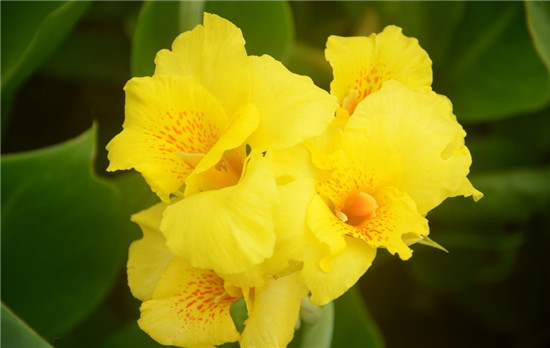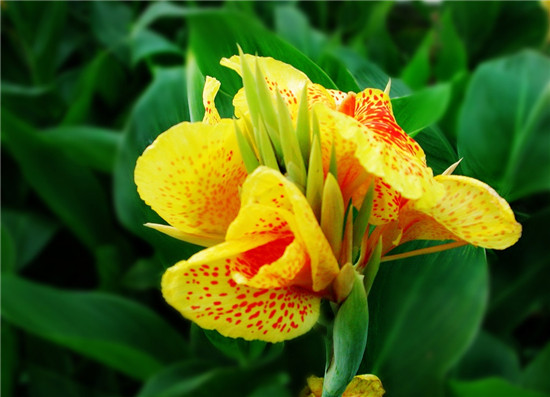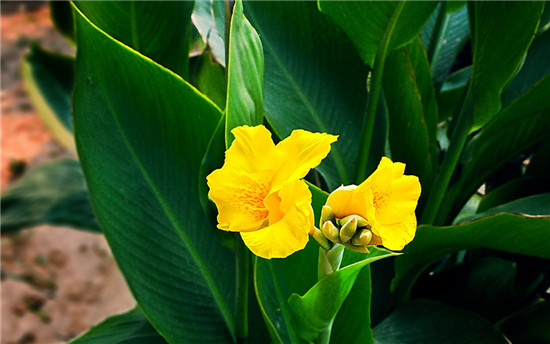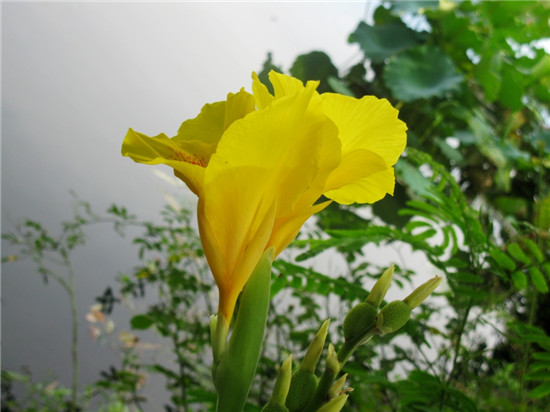[canna] Culture method of Canna
Canna originated from tropical regions such as America, India, and the Malay Peninsula. Now you can watch this plant at home. Let's take a look at his breeding method!

Canna is a tropical broadleaf plant, mainly yellow flowers Canna, safflower Canna two kinds, another improved varieties also showed purple, pink, polychromatic spots. Because the canna flowers open in the scorching heat of the season, bring people to cool the United States, it is not afraid of poison in the brave spirit of praise, flower language for "a better future."
Herbs perennial, plant height up to 100 cm-150 cm, rhizomes plump with massive underground stems; leaves large, spirally arranged, with distinct midveins and pinnate parallel veins, petioles sheath-like clasping, ligule absent, petioles round, green or purplish red; stems and leaves powdery, leaves broadly elliptic. Flowers larger, up to 20 cm in size, petals straight extension, with 4 petalized stamens, colors are milky white, yellow, orange, pink, red to purple.
Canna is a perennial erect herb belonging to the family Canna. Also known as red banana, Tan Hua, Lan banana, dwarf beauty. Native to tropical America and Africa.

It has stout fleshy rhizomes and leaves alternate and broad. Petals sepal, gorgeous petals are actually petalized stamens, racemes, petals according to different varieties of yellow, red and spotted. Seeds larger, blackish brown, testa hard. Flowers bloom from early summer to late autumn.
There are bright red, pink, orange, purple, milky white, purple and red and yellow alternate colors, such as red petals Phnom Penh. The flowering period lasts from May to July and continues to bloom. Among them, the big safflower canna is the most beautiful, named "red coke", so it is called canna. Love warm and humid nature, afraid of cold, like sufficient sunshine, like deep soil and fertile soil, can bear barren, root bud meristem ability is strong, reproduction fast, flowering long, is a good ground cover plants, but also for flower beds, flower diameter, flower scene material.
Classification of Canna varietals
Canna grandiflora: also known as French Canna grandiflora, is an improved species of Canna grandiflora, plant height of 15 meters, stems and leaves are white powder, leaves large, wide oval, about 40 cm long, about 20 cm wide total pedicel long, floret large, rich in color, calyx, petals are white powder, petals upright not curved.

Canna purple-leaf: plant height of about 1 meter, stems and leaves are purple-brown, involucre brown, calyx and petals are purple-red, petals deep purple-red, lips bright red. Canna's fruit is a slightly globose capsule with tubercles and black, hard seeds.
Aquatic yellow canna: plant height of about 1m, leaves are green, flowers are yellow, generally grow in the river, wetland, water level in about ten centimeters, wet, cold.
Aquatic safflower canna: plant height of about 1m, green leaves, flowers are bright red, also grow in the river, wetland, water level of about 10 cm, the best rise, wet, cold. Compared with xerophytic canna, aquatic canna is more suitable for artificial lake, wetland park, river and other waterscape greening.
How to grow Canna
Light and temperature: The growing season requires sufficient light to ensure that at least 5 hours of direct sunlight is received every day. The environment is too dark, insufficient light, will delay the flowering period, like warm, avoid cold, suitable for long temperature 16-30℃. When flowering, in order to extend the flowering period, it can be placed in a place with low temperature and no sunlight, and the ambient temperature should not be lower than 10℃.
Watering and fertilization: after planting rhizomes have not yet grown new roots before, to less watering. The soil in the basin should be moist. Too wet soil tends to rot roots. Scape should be watered regularly after growth, keep the pot soil moist, if water shortage, after flowering easy to appear "leaf clip flower" phenomenon. In winter, watering should be reduced, with the principle of "see dry and see wet". In addition to planting before the application of sufficient base fertilizer, growth season should be applied 3-4 times a month thin pancake liquid fertilizer. If the flower scape does not sprout 20-30 days before the scheduled flowering stage, the leaves can be sprayed once with 0.2% potassium dihydrogen phosphate aqueous solution to promote flowers.

Flowering control: If you want to "May Day" flowering, January will be stored with a small amount of fertilizer soil cover, the environmental temperature requirements of 30℃ during the day, about 15℃ at night, after 10 days can sprout. After budding, plant the rhizomes with 2-3 buds into the pot, keep the pot soil moist, and apply topdressing appropriately. In early April, flower buds appear, pay attention to ventilation,"May 1" can bloom.
Rhizome digging: In cold areas, after 1-2 frosts in autumn and most of the stems and leaves are withered, cut off the ground part, dig out the rhizomes, store them indoors after proper drying, and safely overwinter at 5-7℃. In warm winter, it can be overwintered in the open field without harvesting, but after 2-3 years, it must be dug out and replanted, and at the same time, it can also expand the planting scale.
The above is what I summarized for you Canna cultivation method of the entire content, I hope this article can help you. Please continue to pay attention to us.
After 1-2 times of frost in autumn and most of the stems and leaves are withered, the aboveground parts are cut off, the rhizomes are dug out, properly dried and stored indoors, and the overwintering can be safely carried out under the condition of 5-7 DEG C. In warm winter, it can be overwintered in the open field without harvesting, but after 2-3 years, it must be dug out and replanted, and at the same time, it can also expand the planting scale.
The above is what I summarized for you Canna cultivation method of the entire content, I hope this article can help you. Please continue to pay attention to us.
Related
- Wuhan Hospital Iron Tree Blooming Result Was Instantly Frightened by the Gardener Master
- Which variety of camellia is the most fragrant and best? Which one do you like best?
- What is the small blue coat, the breeding methods and matters needing attention of the succulent plant
- Dormancy time and maintenance management of succulent plants during dormancy
- Minas succulent how to raise, Minas succulent plant pictures
- What are the varieties of winter succulent plants
- How to raise succulent plants in twelve rolls? let's take a look at some experience of breeding twelve rolls.
- Attention should be paid to water control for succulent plants during dormant period (winter and summer)
- Watering experience of twelve rolls of succulent plants
- Techniques for fertilizing succulent plants. An article will let you know how to fertilize succulent plants.



